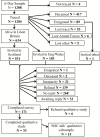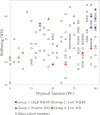Adapting to Aging: Older People Talk About Their Use of Selection, Optimization, and Compensation to Maximize Well-being in the Context of Physical Decline
- PMID: 28364519
- PMCID: PMC5927091
- DOI: 10.1093/geronb/gbw132
Adapting to Aging: Older People Talk About Their Use of Selection, Optimization, and Compensation to Maximize Well-being in the Context of Physical Decline
Abstract
Objectives: Selection, Optimization, and Compensation (SOC) may contribute to successful aging by helping older people maximize well-being in the context of physical decline. To explore this hypothesis, and to investigate the potential for narrative analysis to improve understanding of SOC, we analyze interviews conducted with 15 members of the 6-Day Sample, a cohort of Scots born in 1936.
Method: Interviewees were chosen based on their physical function and well-being scores. Interviews were analyzed to investigate "SOC talk," that is, older people's talk about SOC behaviors in everyday life. Types and amounts of SOC talk were quantified, and talk was narratively analyzed. We hypothesized that older people who engaged in more SOC talk would have higher well-being.
Results: Older people who engaged in high levels of SOC talk had high well-being despite low physical function. Those who engaged in little SOC talk had low well-being despite higher physical function.
Discussion: The concept of successful aging is valuable in part because of its narrative quality: One must strive to keep one's life story developing despite physical decline and other losses. We provide evidence, from the perspectives of older people themselves, of the ways in which SOC may play a role in that process.
Keywords: Adaptation; Narrative; SOC; Successful aging; Well-being.
© The Author 2016. Published by Oxford University Press on behalf of The Gerontological Society of America.
Figures
References
-
- Andrews M. (2009). The narrative complexity of successful ageing. International Journal of Sociology and Social Policy, 29, 73–83. doi:10.1108/01443330910934736
-
- Atkinson P. (2009). Illness narratives revisited: The failure of narrative reductionism. Sociological Research Online, 14 Retrieved from http://www.socresonline.org.uk/14/5/16.html
-
- Baltes P., & Baltes M (1990). Psychological perspectives on successful aging: The model of selective optimization with compensation. In P. Baltes & M. Baltes (Eds.), Successful aging: Perspectives from the behavioral sciences (pp. 1–34). Cambridge, UK: Cambridge University Press. doi:10.1017/CBO9780511665684.003
-
- Baltes M., & Carstensen L (1996). The process of successful aging. Aging & Society, 16, 397–422. doi:10.1017/S0144686X00003603
MeSH terms
Grants and funding
LinkOut - more resources
Full Text Sources
Other Literature Sources
Medical



